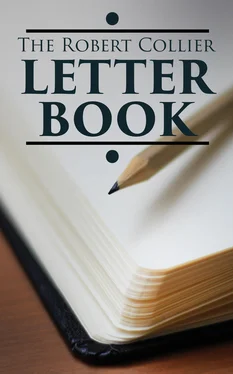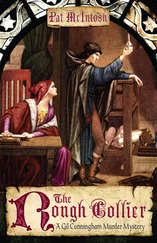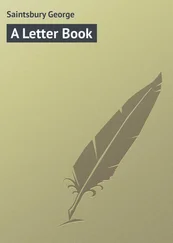It happened that P.E. Collier was my uncle and was responsible for my education, but he had always told me he did not want me in the business until I could bring something to it they could get nowhere else. For that reason, I had never before tried for a place with Collier's, but now I felt I had an idea they could use, so by letter and in person I kept trying to sell it to them.
In Tom Beck I found a sympathetic listener, for Proctor & Gamble are large users of coal, and he had seen many of the letters in our campaign and thoroughly approved the idea of them. So with his help, and that of the VicePresident, G.J. Kennedy, I finally sold them the idea of a six months' tryout.
It was not on any munificent basis, you can be sure of that. I was to have a drawing account of $25 a week, and to receive a commission of 5 percent on any sales I made by mail. To leave a good, secure, salaried job for an uncertain chance like that takes optimism of a high order, but I was young and single, and just fool enough not to know any of the things that could not be done, so I jumped at the chance. Luckily for me, I found a good mentor at Collier's in the person of Bruce Barton, who was then the assistant sales manager in charge of advertising. It was not any part of his duties to lend me a helping hand, but he went out of his way to do it. And to his suggestions and kindly criticisms I owe it that the very first letters and circulars we tried were complete successes. How complete, you can judge by the fact that the profits on our first six months' sales were 34 1/2 percent, and I was making so much money on the 5 per cent commission that the arrangement was promptly cancelled and I was put on a good, living salary.
Collier's had been selling the "Harvard Classics," Dr. Eliot's famous Five-Foot Shelf of Books, for about six years then, and it was their best seller, so of course I started my efforts with it. Their salesmen covered all the big towns, however, so my efforts had to be confined to the little towns and the rural communities, for even after we proved what could be done by mail, Collier's never forgot that their house had been built by salesmen, and they never allowed our mail efforts to interfere with the agent sales.
It was for this reason I left them after five years—to get a bigger field of activity, but meantime they were better than any post-graduate college course
There was Tom Beck, one of these master salesmen you meet once in a lifetime. He could sell any man or group of men practically anything. I have seen him go into meetings where every man was opposed to his idea and come out with every one's approval of his plan. You might not agree with him—but you could not resist him. You had the feeling: "Well, the thing is not practicable, but if Tom Beck gets behind it he'll put it over!"
Then came Bruce Barton, peer of any advertising writer I have ever seen. He used to sketch out the skeleton frame-work of his ads and then give them to me to fill in. It was a liberal education in advertising writing.
And then came George Kennedy, who had started his collection experience ringing doorbells and collecting 50 cts. a month installments on Dickens or Thackeray or some of the old, original volumes Collier's put out. He had been in the business almost as long as old R F. himself, and R F. Collier was the man who started the installment sale of books in this country! What George Kennedy did not know about parting the reluctant debtor from his money certainly is not known to many.
I went with Collier's on the first of July in 1913. On the ninth of August we dropped our first circulars into the mail. They consisted of an illustrated four page letter, the first and fourth pages carrying the letter, the inside pages the illustrations and circular copy.
The letter was sent under first-class postage without fill-in, and a stamped post card went with it. Including postage, the whole thing cost us about 4 cts. in the mail.
You can believe we watched for the returns from those circulars with fear and trembling. We had mailed 10,000 of them, mostly to advertising leads that were from one to two years old, and which had been in the hands of two or more salesmen and been returned as unsalable.
When the orders began to mount up from these old leads, the salesmen who had turned them down—and the whole sales department—sat up and began to take notice. For our first letter to those old discarded inquiries brought back 4 1/2 percent of orders for a $39 set of books!
Four and one-half percent meant that, with letters at 4 cents. each, our orders were costing us less than $1 apiece. Can you imagine that, on a $39 set of books? No wonder we showed a profit for those six months of 34 1/2 percent!
The trouble was that we soon came to the end of those old discarded leads, and after that, the salesmen didn’t let go of them so readily. But while they lasted, the "pickings" were easy. Here is the first letter we used on them:
If Dr Eliot of Harvard Were to Say to You—
"Come around to my home tonight. I want to show you some books that I believe you’ll enjoy; they are interesting, entertaining, yet they will give you all the essentials of a liberal education, even if you can spend only fifteen minutes a day with them."
You’d go, wouldn’t you, and the next morning you’d hasten to get copies of these books.
Now that is, in effect, just what Dr. Eliot has done. From his lifetime of reading, study and experience—forty years of it as President of Harvard University—he has chosen a Five Foot Shelf of just the few books, and only the few, that are really essential to the Twentieth Century American.
Just 15 Minutes a Day, and Then—
And this is what he says to you: I believe that the faithful and considerate reading of these books will give any man the essentials of a liberal education, even if he can devote to them but fifteen minutes a day."
Think of it—The Essentials of a Liberal Education, under the personal guidance of Dr. Eliot, who has trained more men for success and is a greater authority on books and reading than any other man in the world today. What other books, or who else, could offer you so much?
Dr. Eliot’s work is complete. You owe it to yourself at least to examine the result—the fruits of his 40 years’ experience as President of Harvard University. They are not the mere product of his genius—they are the finished utterance of the human race.
Examine the Books for a Week—at Our Expense
Don't send a cent of money. Simply drop the enclosed card in the mail and the complete set of Harvard Classics will be shipped to you from our nearest Branch Office AT OUR EXPENSE. Keep them for a week; browse through them; read them; enjoy them. We won't urge you to buy them either then or now, because we realize that it is up to you to make up your mind in your own way as to just what the books will be worth to you. If you decide to keep them, you can pay for them as you like, even as little as $2.00 a month; if not, you can return them at the end of the week without question at our expense.
Here is your chance to avail yourself of Dr. Eliot's wonderful knowledge and experience to prepare yourself for life. You owe it to yourself to at least SEE and EXAMINE this Library that he selected to speed you on the road to a bigger, broader success. The card brings it to your door, charges prepaid. Merely put your name on it and drop it in the mail.
But remember, in the great book of Time there is but one word—"NOW "—so drop your card in the mail now.
Very truly yours,
* * * * *
The inside pages showed, on the left hand, a great pile of books, piled all over each other until they practically hid the background of the Harvard University buildings. On the right hand was the orderly row of the Five-Foot Shelf, with the Harvard Library behind it. The keynote of the copy was a quotation from Emerson: "In the Bibliotheque Nationale in Paris are a million books. A man might read from dawn to dark for fifty years, yet die in the first alcove."
Читать дальше











